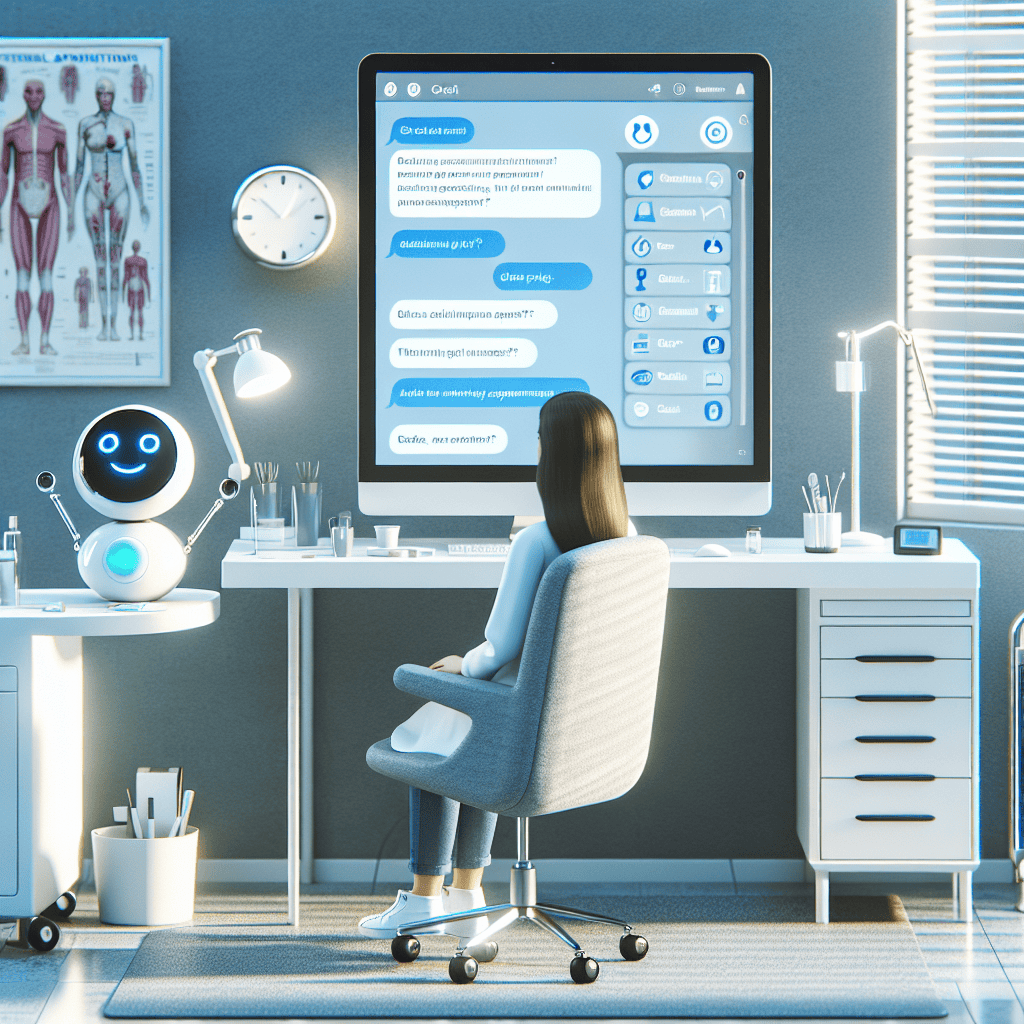Chatbots Ease Appointment Anxiety for Patients with Sensitive Health Concerns

In the digital age, healthcare is undergoing a significant transformation, with technology playing a pivotal role in enhancing patient experiences. One of the most promising innovations is the use of chatbots to alleviate appointment anxiety, particularly for patients with sensitive health concerns. This article delves into how chatbots are revolutionizing patient interactions, providing a detailed exploration of their benefits, challenges, and future potential.
The Rise of Chatbots in Healthcare
Chatbots have emerged as a powerful tool in various industries, and healthcare is no exception. These AI-driven conversational agents are designed to simulate human-like interactions, providing users with instant responses and assistance. In healthcare, chatbots are increasingly being used to streamline processes, improve patient engagement, and reduce the burden on medical staff.
The integration of chatbots in healthcare settings is driven by several factors:
- Advancements in artificial intelligence and natural language processing (NLP) technologies.
- The growing demand for personalized and accessible healthcare services.
- The need to reduce operational costs and improve efficiency in healthcare delivery.
According to a report by Grand View Research, the global healthcare chatbot market size was valued at USD 122.0 million in 2020 and is expected to expand at a compound annual growth rate (CAGR) of 25.8% from 2021 to 2028. This growth is indicative of the increasing acceptance and reliance on chatbots in the healthcare sector.
Case Study: Babylon Health
Babylon Health, a UK-based digital health service provider, has been at the forefront of integrating chatbots into healthcare. Their AI-powered chatbot assists patients in symptom checking, providing medical advice, and scheduling appointments. By offering a user-friendly interface and 24/7 availability, Babylon Health’s chatbot has significantly reduced appointment anxiety for patients, particularly those with sensitive health concerns.
Patients using Babylon Health’s chatbot have reported increased satisfaction due to the convenience and privacy it offers. The chatbot’s ability to provide immediate responses and guidance has empowered patients to take control of their healthcare journey, reducing the stress associated with traditional appointment scheduling methods.
Understanding Appointment Anxiety
Appointment anxiety is a common phenomenon experienced by patients across various healthcare settings. It refers to the stress and apprehension individuals feel when scheduling and attending medical appointments. This anxiety can be particularly pronounced for patients with sensitive health concerns, such as mental health issues, sexual health problems, or chronic illnesses.
Several factors contribute to appointment anxiety:
- The fear of judgment or stigma associated with certain health conditions.
- Concerns about privacy and confidentiality.
- The anticipation of receiving bad news or a difficult diagnosis.
- The complexity and inconvenience of traditional appointment scheduling processes.
Appointment anxiety can have significant implications for patient health outcomes. It may lead to delayed or missed appointments, resulting in untreated health conditions and increased healthcare costs. Addressing appointment anxiety is crucial for improving patient engagement and ensuring timely access to care.
Statistics on Appointment Anxiety
A study published in the Journal of General Internal Medicine found that approximately 30% of patients experience anxiety related to medical appointments. This anxiety is more prevalent among individuals with sensitive health concerns, with 45% of patients with mental health issues reporting heightened anxiety levels.
Furthermore, a survey conducted by the Anxiety and Depression Association of America (ADAA) revealed that 36% of individuals with anxiety disorders avoid medical appointments due to fear and apprehension. These statistics underscore the need for innovative solutions to address appointment anxiety and improve patient experiences.
How Chatbots Alleviate Appointment Anxiety
Chatbots offer a promising solution to alleviate appointment anxiety for patients with sensitive health concerns. By providing a seamless and user-friendly interface, chatbots can address the key factors contributing to appointment anxiety and enhance the overall patient experience.
Here are some ways chatbots help reduce appointment anxiety:
- 24/7 Availability: Chatbots are available round-the-clock, allowing patients to schedule appointments at their convenience without the pressure of office hours.
- Privacy and Confidentiality: Chatbots provide a private and secure platform for patients to discuss their health concerns without fear of judgment or stigma.
- Instant Responses: Chatbots offer immediate responses to patient queries, reducing the uncertainty and stress associated with waiting for appointment confirmations.
- Personalized Interactions: Chatbots can tailor their responses based on patient preferences and medical history, providing a personalized and empathetic experience.
- Streamlined Processes: Chatbots simplify the appointment scheduling process, reducing the complexity and inconvenience associated with traditional methods.
Example: Woebot for Mental Health
Woebot, an AI-powered chatbot designed for mental health support, exemplifies how chatbots can alleviate appointment anxiety. Woebot engages users in conversations to provide cognitive-behavioral therapy (CBT) techniques and emotional support. By offering a non-judgmental and confidential space, Woebot helps users manage their mental health concerns without the anxiety of scheduling in-person appointments.
Users of Woebot have reported reduced anxiety levels and improved mental well-being, highlighting the chatbot’s effectiveness in addressing appointment anxiety for sensitive health concerns.
Challenges and Limitations of Chatbots in Healthcare
While chatbots offer numerous benefits in alleviating appointment anxiety, they also present certain challenges and limitations that need to be addressed for optimal implementation in healthcare settings.
Some of the key challenges include:
- Data Privacy and Security: Ensuring the privacy and security of patient data is paramount in healthcare. Chatbots must comply with regulations such as the Health Insurance Portability and Accountability Act (HIPAA) to protect sensitive patient information.
- Accuracy and Reliability: Chatbots rely on AI algorithms to provide medical advice and assistance. Ensuring the accuracy and reliability of these algorithms is crucial to prevent misinformation and potential harm to patients.
- Limited Human Interaction: While chatbots offer convenience, they lack the human touch that is often essential in healthcare interactions. Patients may require human empathy and understanding, which chatbots may not fully replicate.
- Technical Challenges: Implementing chatbots in healthcare systems requires technical expertise and infrastructure. Integration with existing electronic health records (EHR) and appointment scheduling systems can be complex and resource-intensive.
- User Acceptance: Some patients may be hesitant to use chatbots due to unfamiliarity with technology or concerns about the quality of care provided by AI-driven systems.
Addressing the Challenges
To overcome these challenges, healthcare providers and technology developers must collaborate to ensure the successful integration of chatbots in healthcare settings. This includes:
- Implementing robust data privacy and security measures to protect patient information.
- Continuously updating and refining AI algorithms to improve accuracy and reliability.
- Providing options for human interaction and support alongside chatbot services.
- Investing in technical infrastructure and expertise to facilitate seamless integration with existing systems.
- Educating patients about the benefits and capabilities of chatbots to increase acceptance and adoption.
The Future of Chatbots in Healthcare
The future of chatbots in healthcare is promising, with ongoing advancements in AI and NLP technologies paving the way for more sophisticated and effective solutions. As chatbots continue to evolve, they are expected to play an increasingly integral role in enhancing patient experiences and improving healthcare outcomes.
Several trends are shaping the future of chatbots in healthcare:
- Integration with Wearable Devices: Chatbots are expected to integrate with wearable health devices, providing real-time health monitoring and personalized recommendations based on data collected from these devices.
- Enhanced Personalization: Future chatbots will leverage advanced AI algorithms to offer highly personalized interactions, taking into account individual patient preferences, medical history, and lifestyle factors.
- Multilingual Capabilities: As healthcare becomes increasingly globalized, chatbots will offer multilingual support to cater to diverse patient populations and improve accessibility.
- Collaboration with Healthcare Professionals: Chatbots will work alongside healthcare professionals, providing valuable insights and support to enhance clinical decision-making and patient care.
- Expansion into New Areas: Chatbots will expand their reach into new areas of healthcare, including telemedicine, chronic disease management, and preventive care, offering comprehensive support across the patient journey.
Case Study: Ada Health
Ada Health, a Berlin-based health technology company, is at the forefront of developing advanced chatbot solutions for healthcare. Their AI-powered chatbot provides personalized health assessments and guidance, helping users understand their symptoms and make informed decisions about their health.
Ada Health’s chatbot has been integrated with various healthcare systems and wearable devices, offering a glimpse into the future of chatbot-driven healthcare. By providing accurate and personalized health information, Ada Health is empowering patients to take control of their health and reducing appointment anxiety for those with sensitive health concerns.
Conclusion
Chatbots are transforming the healthcare landscape by easing appointment anxiety for patients with sensitive health concerns. Through their ability to provide 24/7 availability, privacy, instant responses, and personalized interactions, chatbots are enhancing patient experiences and improving access to care. While challenges such as data privacy, accuracy, and user acceptance remain, ongoing advancements in AI and NLP technologies hold the promise of overcoming these obstacles and unlocking the full potential of chatbots in healthcare.
As we look to the future, chatbots are poised to play an increasingly integral role in healthcare delivery, offering innovative solutions to address appointment anxiety and improve patient outcomes. By embracing this technology, healthcare providers can create a more patient-centered and accessible healthcare system, ultimately benefiting patients with sensitive health concerns and the broader healthcare community.




